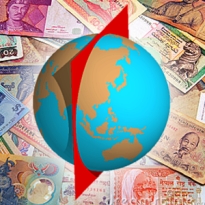 The beancounters at HSBC have released a forecast of how the world’s top economies will fare over the next four decades. In the least surprising prediction ever, China is expected to rule the global economic roost, with the United States of Wal-Mart, er, America, relegated to second place. India is expected to rise from its current eighth place to third, while Japan will fall two spots to fourth. Other major movers include Mexico rising five spots to #8, Turkey moving up six spots to #12, the Philippines making an incredible 27-position leap to #16, Egypt rising 15 spots to #20 and Malaysia rising 17 spots to #21. The main theme envisioned by the rankings is the decline of the west’s developed economies; they currently hold eight of the top-20 spots, but that number is expected to fall to five by 2050.
The beancounters at HSBC have released a forecast of how the world’s top economies will fare over the next four decades. In the least surprising prediction ever, China is expected to rule the global economic roost, with the United States of Wal-Mart, er, America, relegated to second place. India is expected to rise from its current eighth place to third, while Japan will fall two spots to fourth. Other major movers include Mexico rising five spots to #8, Turkey moving up six spots to #12, the Philippines making an incredible 27-position leap to #16, Egypt rising 15 spots to #20 and Malaysia rising 17 spots to #21. The main theme envisioned by the rankings is the decline of the west’s developed economies; they currently hold eight of the top-20 spots, but that number is expected to fall to five by 2050.
HSBC’s projection of an eastward tilt in economic clout is mirrored by the recent Global Gaming Outlook released by PricewaterhouseCoopers (PWC). While PWC expects Asia’s phenomenal casino spending growth to slow to a mere 7.9% by 2015, the cumulative surge in growth will have by then “fundamentally reshaped the landscape of the global gaming industry.” Asia’s share of total global revenues will have risen from 29.2% to 43.4% by 2015, while the US will have fallen from 48.9% to 40.1%, and the region including Europe, the Middle East and Africa (EMEA) will slip from 13.9% to just 10%. As even PWC admits that much of Asia’s casino business flies “under the radar”, its share of the overall market might be closer to 60%, making the other regions even smaller by comparison.
As the US’s major international casino hub, PWC expects Nevada to be “disproportionately affected” by the growth in Asian resort casinos. (Would you fly 12 hours across the Pacific if you didn’t have to?) While Atlantic City’s decline will continue at a slightly slower pace than recent years, the end result by 2015 will be an annual revenue total 46.1% off its 2006 peak.
Similar to the HSBC’s bullish projections, PWC projects a 16.9% compound annual growth rate (CAGR) in the Philippines, resulting in a $1.2b casino market by 2015. Vietnam’s gaming market is only a tenth the size of the Philippines, but it too is expected to witness an impressive CAGR of 15.4%. The only two markets to witness higher CAGR will be Singapore (20.5%) and Macau (21.5%). The lone Asian casino market PWC expects to experience a decline by 2015 is South Korea, but that will only come from the proposed opening of the Japanese market (1.7m Japanese tourists visited a South Korean casino in 2010).
In terms of online gambling, PWC has no concrete data to accurately identify who’s reaping the benefits from the “clearly buoyant” Asian market, or to quantify the sum of money being wagered; “the only certainty is that there is a lot of it.” There’s one other item of which PWC is convinced: Asian countries will continue to have “little incentive” to make progress towards licensed online gambling regimes, meaning the European public gaming companies will remain on the outside looking in at that immense pile of Asian money. Bummer.